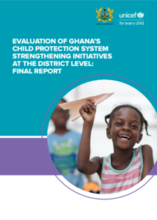Background
After the launch of the Child and Family Welfare Policy (CFWP) in 2015 and the Justice for Children Policy (J4CP) in 2016, the Government of Ghana in collaboration with UNICEF embarked on a workforce strengthening (WFS) initiative in 20 pilot districts. The Initiative aims to strengthen the capacity of the Social Welfare Actors (SWA) to implement the policies, with a focus on the CFWP, using an innovative problem-driven iterative adaptation approach. During 2017 the SWA and allied actors from the pilot districts attended a series of workshops at district, regional and national level to better understand the Policy and reflect on new actions to address identified local child protection problems. Building on districtlevel learning, guidelines were developed to offer a framework of reference for continued implementation of the CFWP.
Evaluation objectives and methodology
Oxford Policy Management (OPM), under the leadership of a Technical Working Group (TWG) representing various government departments, was contracted by UNICEF Ghana to undertake an evaluation of this Initiative. The objective of the evaluation is to document and assess how the capacity of the child protection system—in particular the practices of the SWA—has changed to enable the provision of quality services to children and families with support of the Initiative.
The evaluation covers the period from January 2017, when the Initiative started the sensitisation workshops at district-level, until September 2018 by when the guidelines had been finalised and disseminated to a select number of district representatives. The primary intended users of this evaluation are the Child Protection Unit of UNICEF Ghana and the Government of Ghana, in particular the TWG that supervises the Initiative. The evidence generated through the evaluation is meant to inform scale up beyond the 20 pilot districts as well as document emerging practices.
The evaluation used a qualitative case study approach. Five districts among the 20 pilot districts were purposefully selected to seek an in-depth understanding of whether, how and why change occurred. The case study districts are: Shama, Asokore Mampong, Upper Denkyira West, Lambussie-Karni and Talensi. The findings of this report are based on three research rounds using individual and group interviews with district and national stakeholders, comprehensive document review and observation at some of the Initiative’s workshops. To capture the system perspective of child and family welfare, as recognised in the CFWP, the evaluation engaged with multiple perspectives and paid attention to the interrelationships within the child protection system.

